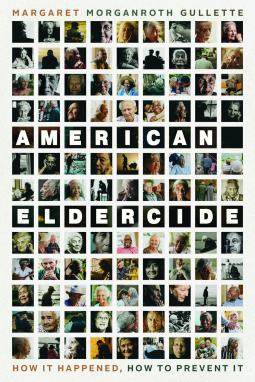
American Eldercide
How It Happened, How to Prevent It
by Margaret Morganroth Gullette
This title was previously available on NetGalley and is now archived.
Send NetGalley books directly to your Kindle or Kindle app
1
To read on a Kindle or Kindle app, please add kindle@netgalley.com as an approved email address to receive files in your Amazon account. Click here for step-by-step instructions.
2
Also find your Kindle email address within your Amazon account, and enter it here.
Pub Date Oct 22 2024 | Archive Date Oct 15 2024
Talking about this book? Use #AmericanEldercide #NetGalley. More hashtag tips!
Description
Twenty percent of the Americans who have died of COVID since 2020 have been older and disabled adults residing in nursing homes—even though they make up fewer than one percent of the US population. Something about this catastrophic loss of life in government-monitored facilities has never added up.
Until now. In American Eldercide, activist and scholar Margaret Morganroth Gullette investigates this tragic public health crisis with a passionate voice and razor-sharp attention to detail, showing us that nothing about it was inevitable. By unpacking the decisions that led to discrimination against nursing home residents, revealing how governments, doctors, and media reinforced ageist or ableist biases, and collecting the previously little-heard voices of the residents who survived, Gullette helps us understand the workings of what she persuasively calls an eldercide.
Gullette argues that it was our collective indifference, fueled by the heightened ageism of the COVID-19 era, that prematurely killed this vulnerable population. Compounding that deadly indifference is our own panic about aging and a social bias in favor of youth-based decisions about lifesaving care. The compassion this country failed to muster for the residents of our nursing facilities motivated Gullette to pen an act of remembrance, issuing a call for pro-aging changes in policy and culture that would improve long-term care for everyone.
Available Editions
| EDITION | Other Format |
| ISBN | 9780226827766 |
| PRICE | $30.00 (USD) |
| PAGES | 328 |
Available on NetGalley
Featured Reviews
 Hannah S, Reviewer
Hannah S, Reviewer
As a personal support worker and having worked in long term care and retirement homes this is such a necessary read. Some parts shocked me, some validated and some emboldened. It was a book that needed to be written so that more can advocate for change.
 Jessica B, Reviewer
Jessica B, Reviewer
American Eldercide: How It Happened, How to Prevent It by Margaret Morganroth Gullette is a powerful and eye-opening critique of the systemic abuse and neglect that older adults face in the United States. Gullette’s writing is both informative and impassioned as she delves into the ways in which society marginalizes, exploits, and devalues its aging population, ultimately leading to what she terms “eldercide”—the silent destruction of older individuals through neglect, mistreatment, and the denial of their rights and dignity.
The book provides a thorough historical analysis, tracing the roots of ageism and examining how cultural and institutional forces have contributed to the current crisis. Gullette offers a sharp critique of the medical and care systems, which often fail to provide adequate care, and calls for systemic change to ensure the safety and well-being of older people. She also emphasizes the importance of societal attitudes shifting toward valuing aging and respecting the rights of older adults, making the book a call to action for readers to advocate for change.
While American Eldercide is undeniably compelling and offers invaluable insights, it can sometimes feel repetitive in its emphasis on the same themes. The solutions proposed, though important, might not feel fully fleshed out in practical terms, leaving some readers desiring more actionable steps. Despite this, the book’s emotional power and intellectual rigor make it an important read for anyone interested in the intersection of ageism, healthcare, and social justice.
Overall, American Eldercide is a crucial contribution to discussions about aging and societal neglect, providing both a critical analysis and a hopeful call for change. Gullette’s writing offers a sobering reminder of the need to protect our elders and address the systemic issues that lead to their suffering.



